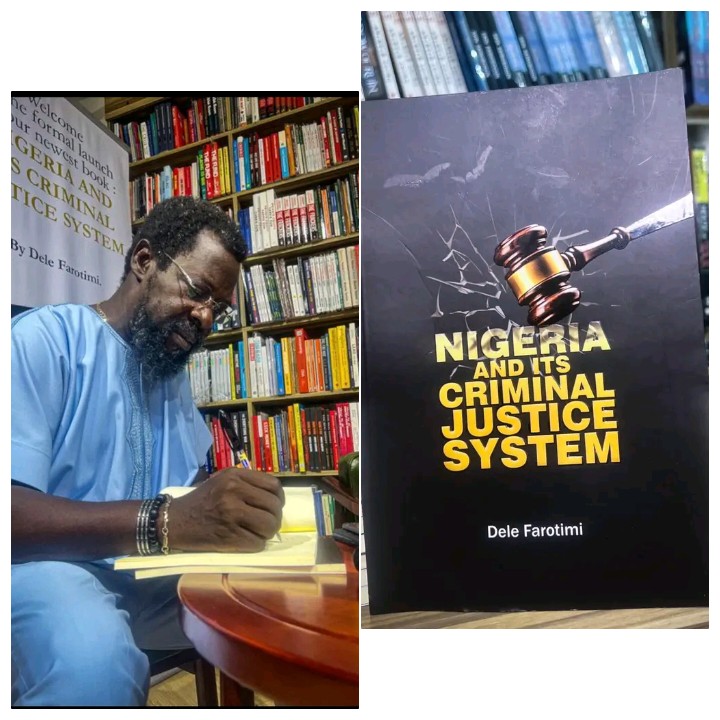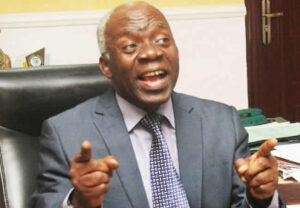
By Sodiq Lawal Chocomilo
I read the book Nigeria and its Criminal Justice System in Nigeria. The book was a sad expose of rots and flaws in the justice system. Lawyers, police officers, and crime reporters who frequent the courts on a regular basis would undoubtedly comprehend the author’s narrations and sad experiences. Dele Farotimi, a Nigerian lawyer, wrote the 63-page book, which is now the most contested in the country.
I knew very little about Dele Farotimi until videos of his harsh criticism of the Nigerian system went viral in the run-up to the 2023 general election. I informed a friend that Dele Farotimi appeared to be a victim or a casualty of the system. I had no idea he would go on to write a book about it. When I told my friend about my sentiments toward Dele Farotimi, he didn’t disagree.
My friend has also got his part of Nigeria’s story. He was remanded for two weeks after taking part in a protest demanding that tuition prices be reduced at a public university. Dele and my friend belong to a colony of people who have been subjected to persecution by the Nigerian system, and my buddy understands how victims express themselves vocally and in writing. If you read the book, you’ll notice a recurring theme throughout Dele’s writing and spoken words: revenge, a common theme in literature.
I’ve read a lot of thoughts on the Dele Farotimi versus Afe Babalola case. I am not a lawyer which simply means my perspective about the matter would not be legally driven. Both characters share similarities and their distinctions. They were both born in a Yoruba town. Farotimi is a lawyer, while Afe Babalola is a senior lawyer. Farotimi is a political activist. Afe Babalola is a political philanthropist. They aligned politically in the 2023 general election. Since the inception of this matter, I’ve read articles in support of Dele Farotimi and Afe Babalola. Each camp cited legal sources and made legal references in their writing. The common ground I’ve discovered here is that the same law that protects Dele Farotimi’s rights will not abandon Afe Babalola’s quest to clear his identity.
For Dele Farotimi, the 63-page book is a revenge. Why do people write books? The most important reason to publish a book is to convey a message that you believe others need to hear. Sometimes you write a novel to relieve mental stress. Farotimi is well aware that he could appeal Afe Babalola to the bench and report judges to the National Judicial Commission, but he chose to publish a book. He also approached the media to promote the book. He purposefully dragged the subject to the court of public opinion, and Farotimi believes that has received justice that he could not obtain in court.
In his book, he lamented the corruption in the judicial system and how the powerful, wealthy, and connected abuse justice through influence. He metamorphically urged that the piece of fabric used to hide the eyes of a statue outside courts portraying fairness to everyone be removed. He depicted an unduly tight relationship between lawyers, clients, and judges. Those who work in the courtrooms are aware that his complaints are not new. The corruption in court is so bad that you have to bribe to register a case or request a faster hearing. As a crime reporter, I’ve seen some surprises in court.
However, there is a distinction between institutions and personalities. You can likely avoid a charge of corruption against an institution without providing evidence, but you cannot do so with a person. If you call Mr. A a thief, you must have evidence to back up your accusation. People in institutions understand how difficult it is to gather evidence to prove their wrongdoings, therefore they continue to thrive there. Another possibility is that individuals are less concerned with gathering proof because they have witnessed how poorly evidence or firsthand accounts have been treated in the past.
Have you forgotten a misguided Senator who felt his colleagues were not appreciative enough and revealed on national television that his wife, a judge in Nigerian courts, had intercepted, intervened, or influenced favorable sentences for his colleagues in the Senate? To date, no one has been held responsible, and there has been no review of cases heard by the wife and her said colleagues in relation to his husband’s colleagues. I’m not even sure if the wife is still a judge.
When problems like this happen, our friends assure us that it rains everywhere. Sure, it rains everywhere, but do we manage it in the same proportion? An institution that decides the lives of countless people should not be permitted to flourish in such turmoil unchecked. When it does, it fosters a natural acceptance of persons like Dele Farotimi who come forward to accuse the justice system of being criminal.
Afe Babalola is an elderly man. I’ve lived with the elderly, and I understand what they desire in their later years. They seek peace. They also wish to preserve their legacy. I understand the motivation for the legal battle. It might be referred to as legacy preservation. However, Baba Afe Babalola sees these claims as potential validations of his legal exploits, which he should not be doing. He has done so much for himself, his people, and the community that he must go past Dele Farotimi’s perception of him in order to reach an out-of-court settlement.
If I were Baba Afe Babalola’s grandson, I would have urged him to let the situation die naturally by either giving it a silent treatment or responding with a modest attack. Dele Farotimi is an underdog in comparison to Baba Afe Babalola. He represents the common people, the bulk of whom have had traumatic experiences in courts ranging from customary to Supreme. They have fathers, siblings, or friends who are lawyers, IPOs, or prosecutors, and they decry in their respective homes, offices furiously whenever they become victims of judicial corruption.
If Baba Afe Babalola is sincerely concerned about his legacy and peace of mind in his latter years, he should allow and encourage out-of-court settlements because he will most likely win in a court of law but lose in public opinion because the courts that would rule over his case have not earned the trust of Nigerians he’s also looking up to. At worst, let him file civil suits. The integrity of Nigerian courts is zero. I conversed extensively with lawyers who are unequivocally in favor of abolishing criminal defamation in Nigeria. They fear it will serve as an excuse for criminals or politicians to siphon public funds, deny people infrastructure, remove evidence, and beg the poor and weak to seek for the same proof in order to avoid jail time.
Arraigning Dele Farotimi in court reinforces his narrative in the minds of Nigerians. There will be new developments that would further drive his sentiments like the cuffing of his hands over misdemeanor. Baba Afe Babalola would bear the mistakes of the police, courts and prison authority. Any action taken or penalty imposed by the court, even if legitimate, would be interpreted as acts of intimidation or tyranny, which he had previously complained about. There is no argument against the judicial system that Dele Farotimi mentioned that ordinary Nigerians have not faced. Judges are influenced by more than just renowned lawyers and political figures. In truth, local politicians have an influence on judges. I have personally encountered a devotee of a federal senator who boasted that he would get a favorable ruling if he contacted his principal. And he received it. Judicial officials, prosecutors, and those who had been following the case were taken aback. Just attend Nigerian courts and witness first hand experiences.
Personally, I would have encouraged Baba Afe Babalola to approach the problem with caution and avoid exaggerating it. Baba unintentionally fell into traps set up by Dele Farotimi in the public court. He is transforming Dele Farotimi into a hero among the majority of Nigerians, who regard courts as abbatoirs where justice is slaughtered in the cold. Whatever Farotimi goes through now, even if it is legal, will be viewed as a kind of influence, harassment, and intimidation, which he has already accused Aare and judges of.
For Dele Farotimi, he’s not seeking for legal victory over the matter. He had already posited that someone can not get justice in courts without influence. The wider picture is pitching his experiences in the hands of authority as Baba Afe Babalola’s use of State apparatus against him, as portrayed in his book. He is driving the horse of practicability towards the notions he spoke about in his book. Corruption in the courts exists. You could be a victim now and a beneficiary tomorrow. When we become victims, we weep, but we also celebrate when we become beneficiaries. Farotimi’s book also revealed that he was a beneficiary. He described how a judge instructed his client to file a suit against execution of court judgment when he knows better that suit on motion would be better and saner.
If I see Baba Afe Babalola today, I will prostrate and tell him that he has worked so hard in his younger years that he deserves a lot of serenity in his latter years. Baba Afe Babalola’s fight is against Dele Farotimi, who unjustly accused him after he lost a case or maybe his biggest client. But this is not totally true. Baba Afe Babalola’s legal struggle with Dele Farotimi is indirectly contesting the public’s perception of Nigerian courts. He is indirectly removing the stain from courts, who have shown many Shege.
I am not asking Baba Afe Babalola not to clear his name but I really don’t think Nigerian courts deserve the honor he has extended to it as a validation or right measure. I also think criminal defamation is an overkill. I recognize that the matter is already under judicial consideration and therefore prohibited from public discussion but I’m a man of easy temptations. I really wish Baba Afe Babalola well.









